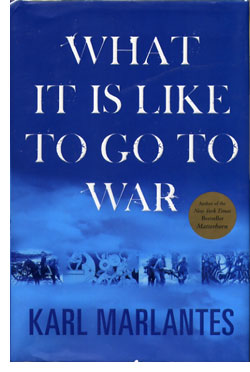 |
 Karl Marlantes
Karl Marlantes
What It Is Like to Go to War
Reviewed by: Rick Kleffel © 2011
Atlantic Monthly / GroveAtlantic Press
US Hardcover First Edition
ISBN 978-0-802-11992-6
Publication Date: 08-30-2011
258 Pages; $25.00
Date Reviewed: 11-07-2011
Index:
Non-Fiction
We assume that the adults are in charge, especially when it comes to the big decisions — for example, sending our sons and daughters into war. It's 2011; by now we have a pretty good idea of what to do, and what to expect. The consequences of that decision have been thought through, beginning to end — or have they?
Karl Marlantes makes a powerful argument that we've actually forgotten many of the most important preparations for war in his slim, elegant and hard-hitting 'What It Is Like To Go To War,' a non-fiction companion to his monumental novel 'Matterhorn.' Here, he exhibits an equally high level of writerly skill as he works in a very different manner and medium.
'What It Is Like To Go To War' is an examination of how we currently prepare the boys and girls (by and large, they are not adults) we send into battle by way of Marlantes' experiences when he was sent to Vietnam. The tech we use in the field has changed radically, but the way we prepare our children has not. War, Marlantes argues, is a searing spiritual experience, but we never even think to address that aspect before we hand soldiers their guns and ask them to kill. It's an oversight that has lifelong consequences for warriors and their families.
Marlantes' book is admirably direct. In eleven short chapters, he addresses a variety of aspects of war from the perspective of a man who went to war as a partially-educated youth, and managed to return, complete his education, and spend some forty years thinking about his experiences. Any given chapter will include visceral stories of his time in Vietnam and perhaps Jungian analysis, introspection about his own personal aftermaths, sociological and psychological insights, historical and literary perspectives on war, and more. It's all superbly written in prose that ranges from poetically raw to analytically insightful. He breaks war down into intelligible parts whose sum is clearly greater than the whole. Marlantes manages to speak for all soldiers in a voice that is clear, elegant, engaging and deeply readable.
For a man who went to Vietnam and returned, his message is not so dark as one might expect. He does not take it upon himself to offer political fixits or hard condemnations. He's much smarter than that. By showing with both anecdote and analysis the effects of war on the psyches of the youth sent to fight, he lets his readers reach the same conclusions he reaches. If war is ever with us, and it is likely to be so, then we had best understand what we are asking so that we can offer those sent to sacrifice in our names the best chance of rejoining us as one of us.
While Marlantes holds back from offering prescriptions as to what must be done, readers need not and should not, indeed, will not, feel the same way. This is a book that needs to be bought twice. Readers will want to buy it for themselves to understand just what the title implies; this book will indeed convey very precisely in visceral and intellectual terms, what it is like to go to war. Marlantes succeeds beyond any doubt in this regard.
But his real triumph is that readers will want that second book to hand, to send to anyone supposedly representing them in our government. Those who are in charge are not adults; not until they've read this book and internalized the experiences, the expertise here. Going to war should not begin with worries about national defense, and international conflicts. When we go to war, our first thoughts and concerns needs must be of those we are sending in our stead. Our warriors will fight not just with guns and lives. They will enter into an intense, profound spiritual battle, and we must win that war before they ever set foot on foreign soil to ensure that they can truly return home.
|
 |




